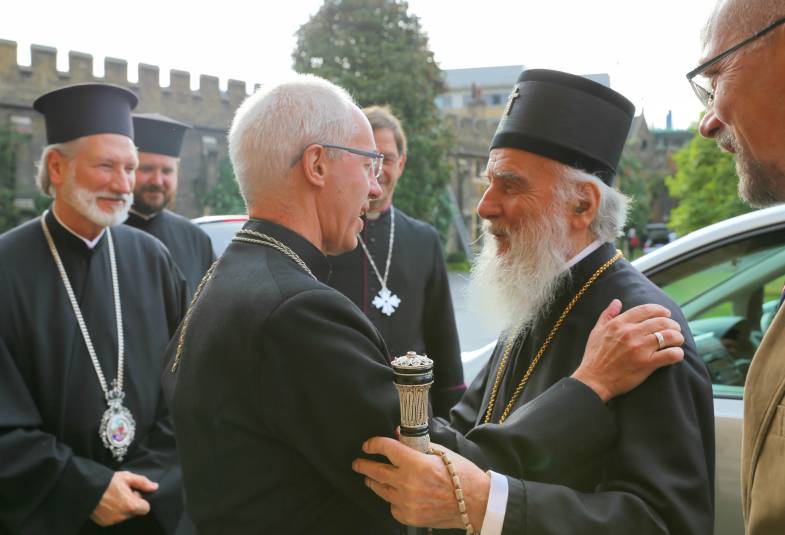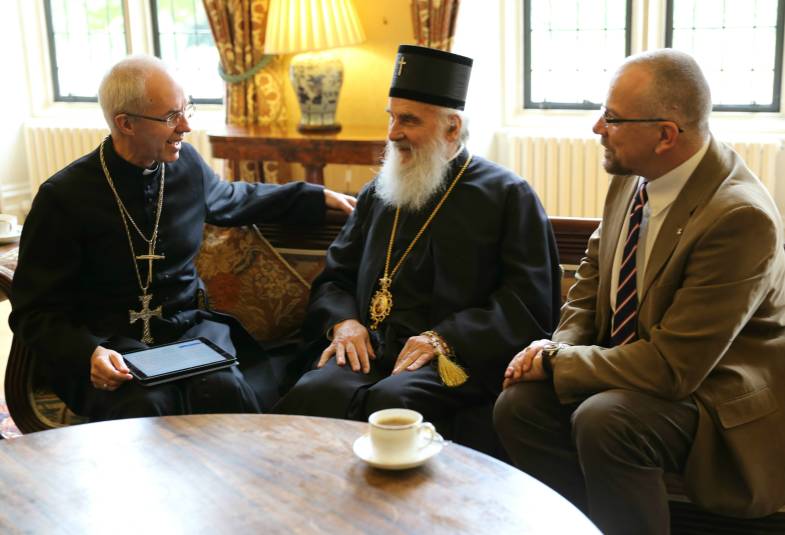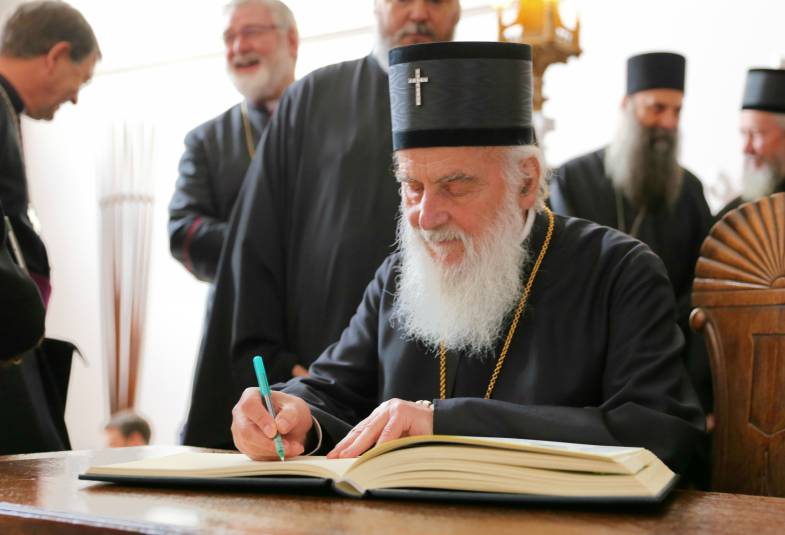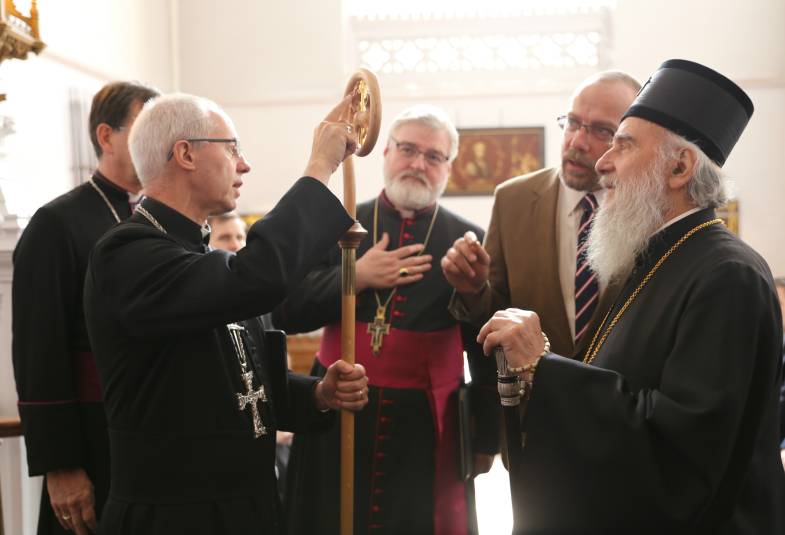13/10/2016

The Archbishop of Canterbury welcomed His Holiness Irinej, Archbishop of Pec, Metropolitan of Belgrade-Karlovci, Patriarch of Serbia, and a delegation from the Serbian Orthodox Church to Lambeth Palace today.
Archbishop Justin Welby invited His Holiness Irinej to make an official visit to the UK as an expression of the historic warm and strong relationship between the Church of England and the Serbian Orthodox Church, which reflects the enduring friendship of the two countries.
The visit is also an opportunity to celebrate the centenary of the visit of St Nicolai Velimirovich, when he became the first Orthodox Christian to preach from pulpit of St Paul’s Cathedral.
This anniversary will be marked at Evensong at St Paul’s tomorrow, at which His Holiness Irinej will preach, at the invitation of the Dean of St Paul’s.

Read the Archbishop’s official welcome to His Holiness Patriarch Irinej:
Your Holiness, I have great pleasure and it’s a great privilege to welcome you and your delegation to Lambeth Palace today.
I find it very moving to have learned more of the long history of friendship between the Serbian Orthodox Church and the Church of England. I am particularly conscious that this is the 100th anniversary of the extraordinary moment when St Nicolai Velimirovich, as a young priest monk, visited England and made a big impact on so many people. Perhaps I can quote a particularly powerful passage from that deeply inspiring sermon. He said:
“I am coming from Serbia, from European ‘midnight’. There is no ray of light, not a single trace. All the light went from the ground to the sky and the sky is the only place where the light is coming from. Nevertheless, we that are weak in everything are strong in faith and hope that dawn will soon arrive.”
Tomorrow evening, Your Holiness will preach at St Paul’s, an occasion that will be full of emotion and memory. On this occasion, far from this being a new thing, we have memories of the extraordinary hospitality and your welcome to the Anglican community in Serbia for a hundred years. I think, particularly, of your wonderful welcome to my Apokrisarios and the annual welcome on Christmas Eve to the Anglican community in your own Patriarchal chapel.
Once again, today, Serbia finds itself on the frontier of Europe, facing the countless tens of thousands driven by darkness from their own homes. And, tragically, as in the past, Europe has not, in a united way, risen to this challenge, and Serbia has had to bear a great burden – and the Orthodox Church has demonstrated, again, its faithfulness.
But there is more light than a hundred years ago. The reconciling light of Christ has shone across Europe for much of the last decades. Under your leadership the Serbian Orthodox Church has played a great role in building the nation.
In your Patriarchal ministry you have been a tireless advocate for peace and stability, and the deep strength of the Serbian Orthodox Church in prayer and religious community – a strength recognised by His Royal Highness Prince Charles.
Your commitment to reconciliation and the work of your church in catechesis, and in the training of Christians to know their faith and to be inhabited by the Spirit of Christ: all these are an inspiration and challenge to us.
We are most grateful for your visit. I am sure we will learn much from you and deepen our friendship in the gospel of Jesus Christ.

Read His Holiness Patriarch Irinej's response to Archbishop Justin:
Your Grace, I am grateful for these wonderful words which you have put across to me. Most of all thank you for convening this meeting in regard to a wonderful occasion, that you have found it fit and right to invite us to visit you, to discuss many problems which touch upon what is important to both our churches and nations – and to thus speak to each other as children of God and as brothers in Jesus Christ.
Thank you for offering the opportunity to mark one very important moment in the life of the monk priest Nicolai Velimirovic, in regard to the famous sermon that he gave at St Paul’s Cathedral. And, as you know, in this sermon he makes mention of the so-called Tower of Skulls, a magnificent temple built on human bones, which is located in the city of Niš. The city in which Emperor Constantine was born. The city in which I presided as bishop for 30 years.
It is from Niš that I was transferred to Belgrade, to my quite deep regret. For although I was not born in Niš, nor in the vicinity of Niš, I grew to love this city and its people, who for a long time now have been living in quite a lot of hardship, but they have kept the faith. It’s a people who have displayed tremendous love towards the church, and therefore it is a people where I have found myself to be with my own.
I am very glad and it makes me very happy, I am honoured that I am sitting together with my brothers Arch Hierarchs, in this great place where you, Your Grace, are the host. And not only the keeper of this important institution but also the host to all of us, our people as well as our church.
It has a positive view towards a very great state with its mighty history and culture. And it was Nicolai Velimirovic who revealed this magnificent history and culture to us as the church of the Serbian nation. He loved this country and this nation. He loved the culture of this nation. He loved many of its people and some of them were very significant: not only persons of importance to local history, but to the global world culture.
And, speaking as one of his successors, it is he who has drawn our attention towards England. From then onwards – and I believe that we have people who have become aware of England of course at an earlier date as well – our nation has nurtured a very friendly relationship, reaching out to the English nation, as was especially manifest during the First World War, during which Nicolai spoke a lot in London, in England, and got many doctors, nurses and other people from this city and nation interested in us, who helped us a great deal during the Great War.
It is with special respect that we remember particularly the doctors and the nurses of your nation who rushed to a deeply wounded nation to help. In doing so they made tremendous sacrifices, and some of them laid down their lives in Serbia for Serbia. Some of them were shot by the forces of the then so-called Austria-Hungary, another significant number died through typhoid. It was the plague of the times, indeed among the people and the army many died. And I would like to reiterate that many of those who died of typhoid were precisely the people involved in medical treatment. This has bonded our nation forever to England.
Later on, accordingly, our history remained in the same line that was opened and traversed by the English nation. We are also aware of the role that Britain played in the Second World War, receiving our government in exile – residing in London for a time – as well as the established royal House. And all of that has grown deep roots into the body of our relations.
It is true, shall we say, that in the recent period we were overcast by certain shadows. This is the period of the 1990s, when, to our big surprise, England joined the other countries of Europe in the bombing campaign over Serbia from which we suffered a lot of hardship and pain in many fields. Nonetheless, I do hope that this is just a cloud which will soon enough be expelled by some other wind from the field of our relationships.
I do hope that this visit of ours transpires in such a spirit and retains such a direction. That is why we are here and that is why we shall speak. And we shall, thus, try to realise that which is the thought and that which is the deed of the church of Christ, namely to build peace amongst nations, and, following closely your own programme, we shall work for peace amongst the churches, and, of course, amongst different religions as well.
We should and we must understand we are the children of the church, and most of all and firstly we are children of God – as well as all the other people who exist on this planet. Therefore we have a duty towards our own selves but also to others to point and indicate what is the meaning of the gospel of Christ.
In today’s times, which are saturated with confusion and unrest, and also by crimes committed in the world, we need to introduce a new spirit into the relationships between states and peoples, and to persevere in continuance to Christ’s reason for entering into this world. It is precisely there where the churches have the greatest and most important role to play.
This is why we must seek ways which allow us to approach each other more closely, to put aside that which possibly divides us and makes us become distant. But at the same time to build from within that which is common to us – and indeed there is much in common between you and us, both of us and the Roman Catholics, and, of course, the Protestant world.
It is on that foundation that we need to build our common relationships. I trust this is the will of God, and that this is what God expects from us. This is why we need to be servants of the mission, of evangelisation in our times and in our world.
